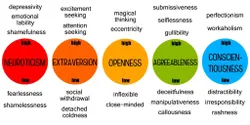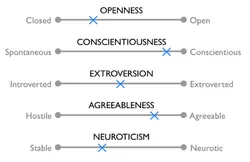Feb 14, 2024
Big Five
Here are some words to describe personality:
Adaptable: Able to respond to change, such as a new job role or work environment
Assertive: Confident and strong
Ambitious: Determined and aspiring
Conscientious: Reliable, hardworking, and goal-directed
Compassionate: Having or showing sympathetic consciousness of others' distress and a desire to alleviate it
Curious: Able to be interested in and understand unknown things
Easygoing: Relaxed, tolerant, and not prone to rigid rules
Charismatic: Charming, fascinating, full of personality, and appear confident
Responsible: Accepts responsibility for their actions, keeps their word, and can be trusted
Respectful: Values diversity, listens to other viewpoints, and conducts themselves with decency toward others
Here are some words that can be used to describe personality:
Cheerful: A happy and positive person who can cheer others up
Assertive: A confident and strong person
Conscientious: A reliable and hardworking person
Easy-going: A relaxed person
Kind: A caring and good-hearted person
Mature: A reliable person with an older mind
Loyal: A person you can always trust to be there for you
Outgoing: A sociable person
Open-minded: A person who will listen to new ideas
Responsible: A person who is aware of the need to do a job that is significant to everyone
Creative: A person who can think outside the box and come up with innovative solutions to complex problems
Adventurous: A person with a stable propensity to adventurous behavior
Charismatic: A charming and fascinating person who appears confident and helps others feel confident
Adaptable: A person who can respond to changes, such as a change in job role, work culture, or working environment
Personality test : A test that helps people understand their own characteristics, behaviors, and feelings. It tries to show what kind of person you are, such as if you’re more outgoing or shy, and how you might react in different situations.
1. Do you think personality tests can accurately describe a person’s character? Why or why not?
2. Have you ever taken a personality test? What did you learn about yourself?
3. Do you believe people’s personalities can change over time, or do they stay the same?
4. How can personality tests be useful in the workplace or in choosing a career?
Big Five Personality Test FAQ
Q. WHAT IS THE BIG FIVE PERSONALITY TEST BASED ON?
A. The Big Five personality test is based on many years of research. Scientists found that people’s personalities can be described using five main traits, which are called the Big Five. This model is widely accepted as the best way to understand personality differences and is used in most personality research today.
Q. WHAT ARE THE BIG FIVE PERSONALITY TRAITS?
A. The Big Five traits are:
Openness: How open you are to new ideas and experiences.
Conscientiousness: How organized and goal-focused you are.
Extraversion: How much you enjoy being around other people.
Agreeableness: How much you care about others and their needs.
Neuroticism: How sensitive you are to stress and negative emotions.
Each trait affects how we think and behave, and they are separate from each other. For example, being outgoing (Extraversion) doesn’t mean you are necessarily more or less organized (Conscientiousness).
Q. HOW LONG IS THE BIG FIVE TEST?
A. The test has 60 questions and takes about 5-10 minutes to complete.
Q. WHAT WILL MY BIG FIVE TEST RESULTS LOOK LIKE?
A. You will get a short, free report with basic results. You can pay a small fee to unlock a more detailed report. You can see a sample report to know what to expect.
Q. HOW CAN I ACCESS MY BIG FIVE PERSONALITY TEST RESULTS?
A. After taking the test, you can create an account with your email address. This lets you view your results anytime by logging into Truity.com. We don’t email results to you.
Q. DO I NEED TO COMPLETE THIS PERSONALITY TEST ALL AT ONCE?
A. If you are logged into your account, your answers will be saved as you go. If you’re not logged in, you will need to finish the test in one go.
Q. IS THIS PERSONALITY TEST REALLY FREE?
A. You can take the test and see an overview of your results for free. If you want a more detailed report, you can buy it for a small fee.
Q. IS THIS BIG FIVE PERSONALITY TEST ACCURATE?
A. Yes, this test is accurate and based on extensive research. It has been tested to ensure it works well and gives reliable results. Your scores show how you compare to a large group of people.
Q. WHAT DOES IT MEAN THAT THE BIG FIVE TEST IS CLINICALLY REVIEWED?
A. The test has been checked by a psychologist to make sure it is reliable and valid. Dr. Steven Melendy, who has a doctorate in clinical psychology, reviewed the test to ensure it meets high standards.
Q. CAN I HAVE MY EMPLOYEES, TEAM, OR GROUP TAKE THE BIG FIVE TEST?
A. Yes, you can. Truity offers a platform for businesses to give the Big Five test to groups, with discounts available. You can find more details on our Testing for Business page.
Q. WHAT IS THE DIFFERENCE BETWEEN BIG FIVE, FIVE FACTOR, AND THE OCEAN MODEL OF PERSONALITY?
A. Big Five, Five Factor, and OCEAN all refer to the same idea: the theory that personality can be divided into five main traits. These names are different ways of describing the same model.
Q. ARE YOU GOING TO SELL MY DATA?
A. No, we don’t sell your email or other data. We follow strict privacy laws and have a no-spam policy. You can read more in our privacy policy.

What is the Big Five Model?
The Big Five Model, also known as the Five-Factor Model, is the most widely accepted personality theory held by psychologists today.
The theory states that personality can be boiled down to five core factors, known by the acronym CANOE or OCEAN.
Conscientiousness – impulsive, disorganized vs. disciplined, careful
Agreeableness – suspicious, uncooperative vs. trusting, helpful
Neuroticism – calm, confident vs. anxious, pessimistic
Openness to Experience – prefers routine, practical vs. imaginative, spontaneous
Extraversion – reserved, thoughtful vs. sociable, fun-loving
The Big Five remain relatively stable throughout most of one’s lifetime. They are influenced significantly by genes and the environment, with an estimated heritability of 50%. They also predict certain important life outcomes such as education and health.
For instance, when measuring Extraversion, one would not be classified as purely extroverted or introverted, but placed on a scale determining their level of extraversion.
By ranking individuals on each of these traits, it is possible to effectively measure individual differences in personality.
What is Conscientiousness?
Conscientiousness describes a person’s ability to regulate impulse control in order to engage in goal-directed behaviors (Grohol, 2019). It measures elements such as control, inhibition, and persistence of behavior.
A person with high Conscientiousness is a person who usually
✅ demonstrates competence
✅ is organized
✅ is dutiful
✅ strives to reach goals
✅ is self-disciplined
✅ is deliberate in their actions
A person with low Conscientiousness is a person who usually
✅ lacks competence
✅ is disorganized
✅ is careless
✅ procrastinates
✅ is undisciplined
✅ is impulsive

Big Five Personality Traits: The 5-Factor Model Of Personality
The Big Five Personality Test
By undefined
10 notes ・ 28 views
English
Advanced